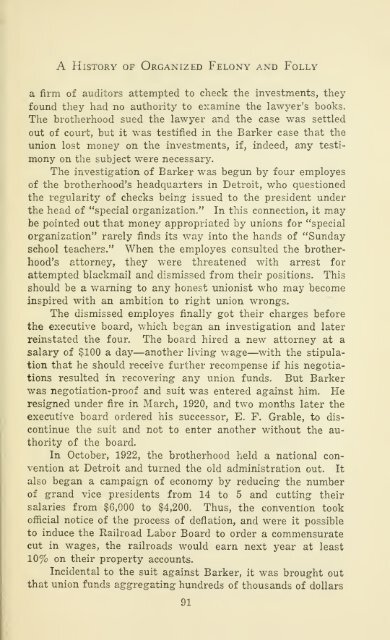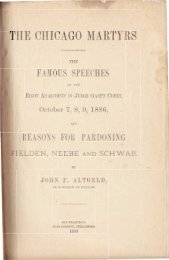A History of Organized Felony and Folly - The Clarence Darrow ...
A History of Organized Felony and Folly - The Clarence Darrow ...
A History of Organized Felony and Folly - The Clarence Darrow ...
Create successful ePaper yourself
Turn your PDF publications into a flip-book with our unique Google optimized e-Paper software.
A <strong>History</strong> <strong>of</strong> <strong>Organized</strong> <strong>Felony</strong> <strong>and</strong> <strong>Folly</strong><br />
a firm <strong>of</strong> auditors attempted to check the investments, they<br />
found they had no authority to examine the lawyer's books.<br />
<strong>The</strong> brotherhood sued the lawyer <strong>and</strong> the case was settled<br />
out <strong>of</strong> court, but it was testified in the Barker case that the<br />
union lost money on the investments, if, indeed, any testimony<br />
on the subject were necessary.<br />
<strong>The</strong> investigation <strong>of</strong> Barker was begun by four employes<br />
<strong>of</strong> the brotherhood's headquarters in Detroit, who questioned<br />
the regularity <strong>of</strong> checks being issued to the president under<br />
the head <strong>of</strong> "special organization." In this connection, it may<br />
be pointed out that money appropriated by unions for "special<br />
organization" rarely finds its way into the h<strong>and</strong>s <strong>of</strong> "Sunday<br />
school teachers." When the employes consulted the brother-<br />
hood's attorney, they w^ere threatened with arrest for<br />
attempted blackmail <strong>and</strong> dismissed from their positions. This<br />
should be a warning to any honest unionist who may become<br />
inspired with an ambition to right union wrongs.<br />
<strong>The</strong> dismissed employes finally got their charges before<br />
the executive board, which began an investigation <strong>and</strong> later<br />
reinstated the four. <strong>The</strong> board hired a new attorney at a<br />
salary <strong>of</strong> $100 a day—another living wage— ^with the stipula-<br />
tion that he should receive further recompense if his negotiations<br />
resulted in recovering any union funds. But Barker<br />
was negotiation-pro<strong>of</strong> <strong>and</strong> suit was entered against him. He<br />
resigned under fire in March, 1920, <strong>and</strong> two months later the<br />
executive board ordered his successor, E. F. Grable, to dis-<br />
continue the suit <strong>and</strong> not to enter another without the authority<br />
<strong>of</strong> the board.<br />
In October, 1922, the brotherhood held a national con-<br />
vention at Detroit <strong>and</strong> turned the old administration out. It<br />
also began a campaign <strong>of</strong> economy by reducing the number<br />
<strong>of</strong> gr<strong>and</strong> vice presidents from 14 to 5 <strong>and</strong> cutting their<br />
salaries from $6,000 to $4,200. Thus, the convention took<br />
<strong>of</strong>ficial notice <strong>of</strong> the process <strong>of</strong> deflation, <strong>and</strong> were it possible<br />
to induce the Railroad Labor Board to order a commensurate<br />
cut in wages, the railroads w^ould earn next year at least<br />
10% on their property accounts.<br />
Incidental to the suit against Barker, it was brought out<br />
that union funds aggregating hundreds <strong>of</strong> thous<strong>and</strong>s <strong>of</strong> dollars<br />
91
















